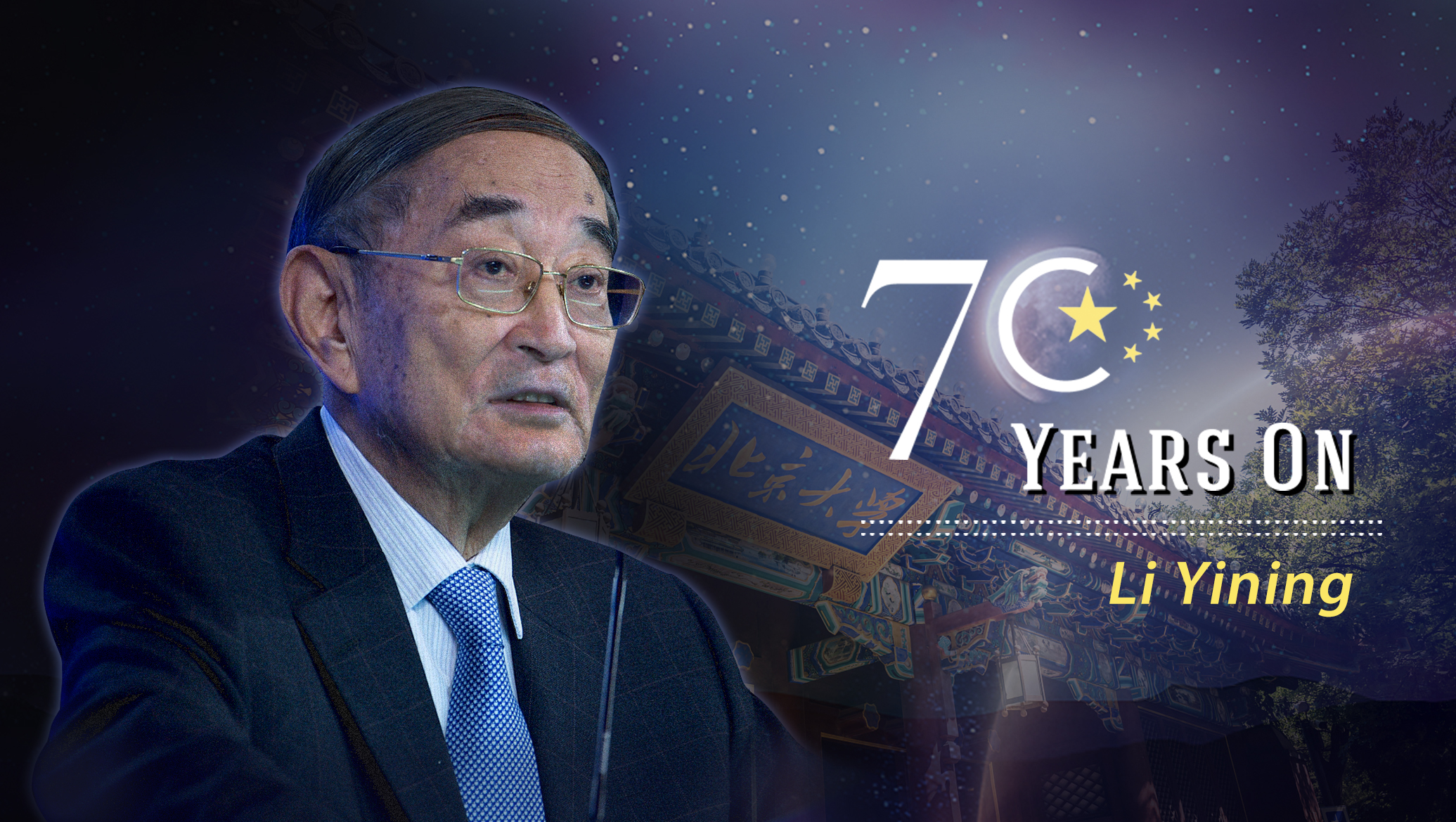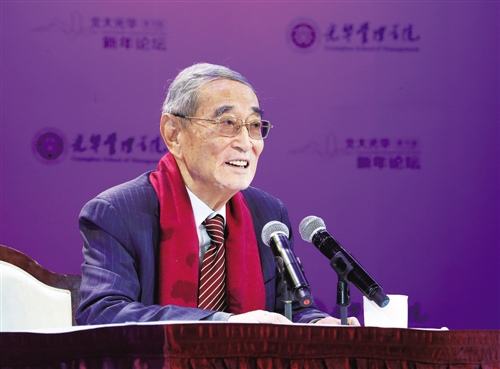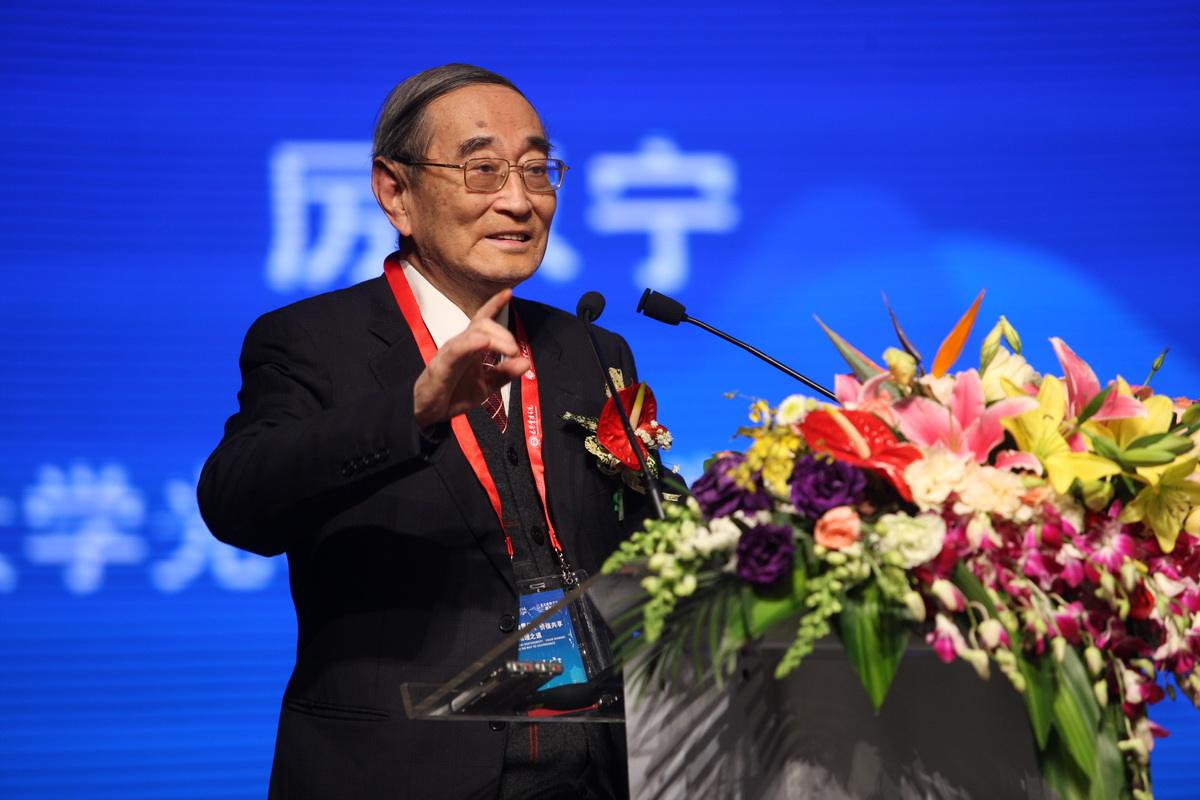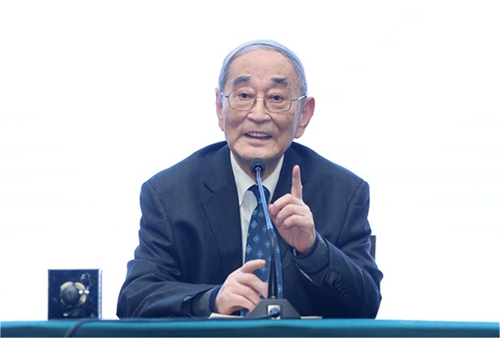[70 years on] Li Yining: China’s pioneering reformer
Sep 30, 2019
Editor’s Note: This story is part of a series of articles celebrating the 70th anniversary of the founding of the People’s Republic of China. Each article shines the spotlight on one PKUer who has made remarkable contributions to China’s recent development, highlighting not only the importance of their individual accomplishments, but also the significant impact Peking University has had on China’s development over the past 70 years.
Peking University, Sept. 30, 2019: Li Yining graduated from Peking University in 1955 and is currently the honorary dean of Guanghua School of Management at PKU. Professor Li Yining is one of the earliest scholars in China to propose reforms to the shareholding system and continues his work on reforms today. His contributions have had a great impact on the development of China’s economy and have earned him the honorary title of “Pioneer of China’s Reform and Opening-up”.
 Li Yining
Li Yining
Literature, chemistry and economics
Li Yining was born in Nanjing in 1930 and received good education for both primary and middle school. When he was four years old, his family moved to Shanghai, where he studied at famous schools, like Nanyang Model High School. Later when he returned to Nanjing in 1946, his learning continued at the school affiliated with Nanking University. Li was deeply enchanted with Chinese and foreign literary classics such as Three Kingdoms, Chinese poetry, and works of Balzac and Maupassant. In high school, under the influence of excellent math and physics teachers, Li's interest gradually turned from literature to science.
On the eve of his high school graduation, Li visited a large chemical factory. Among the chimneys and against the roar of machines, Li learned about the importance of fertilizer production to China's agricultural development and decided to devote himself to industry to help his country. After graduation, Li was admitted to the Department of Chemistry at Nanking University where he intended to pursue his goal. After Nanking was liberated, Nanking University was closed, forcing Li to suspend his education and work as an accountant.
Two years later, Li Yining decided to take the college entrance examination. He entrusted his friend, Zhao Huijie, who was studying in Peking University, to apply for the exam on his behalf. Despite Li’s interest in chemistry, Zhao thought his friend was better suited to study economics because of his literary skills, his wide range of knowledge, and previous work in accounting. Therefore, when Zhao applied for the exam on Li’s behalf, he chose economics as his friends’ intended major.
Days in PKU
Li Yining was accepted to Peking University and during his four years as a student, he eagerly learned economics. He spent his winter and summer vacations in the library and devoted himself to his studies. Li Yining was an excellent student and always asked questions and sometimes was even invited to his teachers’ houses to further discuss and study important topics. In his second year at PKU, his first economic research article was published demonstrating his ability and ambition.
Li always said that he owed his success to his teachers at PKU who guided him to explore the field of economics. Among his many teachers, Chen Daisun was an influential not only in Li Yining’s education, but for generations of PKU students. After earning his doctorate in economics from Harvard University in 1926, Chen Daisun returned to China and cultivated six generations of students focusing on economics. Li Yining was also appreciated by many of his other teachers including Chen Zhenhan, Zhao Qiutuan and Zhou Binglin. These teachers not only provided him with the tools to understand economics, but it was likely their influence that led Li Yining to research the laws of the modern economy to serve his country and his people.
Due to his excellent academic performance, Li Yining stayed at the Department of Economics after graduation in 1955. The political environment, however, made it difficult for Li to pursue his ambitions so he chose to work in the department reference room. Although the twenty years Li Yining spent working in the library were solitary and lonely, he was able to avoid the political turmoil while continuing to learn and think independently. As he saw it, "It was another stage for me to accumulate knowledge. My horizons were broadened." Outside his work in the reference room, China’s economic environment during that period gave Li Yining a realistic understanding of Chinese economic problems. As he explained, everything he had experienced during those years honed his will. In the late 1970s when science and universities again rose to prominence, Li began his teaching career at Peking University. He was promoted to associate professor in 1979, to full professor in 1983.
 Li Yining
Li Yining
Reform pioneer
Li Yining played a key role in designing China's economic reform. At Peking University’s "May Forth Scientific Symposium" in 1986, Li proposed that the success of China's economic reforms depended on reforming ownership rather than price reforms. That meant that reforming the shareholder structure of state-owned enterprises was necessary. For Li Yining, the establishment of a socialist market economic system, the effective allocation of resources, and the real transition of the Chinese economy all rested on enterprises having the right to operate independently and the obligation to bear operational risks.
Reforming ownership was the most difficult aspect of shifting China’s economic system because as it touched property rights, the most sensitive issue. When faced with pressure, Professor Li Yining stood by his advocacy of ownership reform. With honesty and rigorous scholarship he fully demonstrated his confidence of his theory and scientific spirit of an economist. He actively promoted property rights reform and changes to the system of state-owned enterprises. He also presided over the draft of the Securities Law and the Securities Investment Fund Law.
After 2003, Li Yining's work shifted to focus on economic development in the private sector. He promoted the publication of Several Opinions on Encouraging, Supporting and Guiding the Development of Private Economy which, upon its release in 2005, was highly influential in shaping China’s private sector. His contributions to China's economic reforms earned him high praise and a myriad of awards.
 Li Yining
Li Yining
Stay thinking and keep reforming
On key points of reform, Professor Li Yining would always offer his suggestions. He is among the first scholars to propose that moral regulation plays an important role in market regulation. He believes that moral regulation is the third “hand” that regulates the allocation of resources along with market regulation and government regulation. The power of habit and moral regulation derives from economic agents themselves – including individuals and economic entities. Agents influence social life and change the resource utilization efficiency by acting in accordance with traditions, moral beliefs and principles. The gap between market and government to regulate the economy should be filled with habits and morals.
Li emphasized the importance of developing the countryside as well as urban-rural integration in China. In 2008, Li authored an article stating that the Chinese economy would grow sustainably and healthily once urban-rural dualism was successfully reformed. He believed that comprehensive reform addressing the urban-rural divide is helpful in perfecting the socialist market economic system, enhancing urbanization, further developing agriculture, and reducing the income gap. In 2010, Li explained that two-way urban-rural integration should be promoted, which would allow rural citizens to resettle cities and urban citizens to resettle in rural areas. He argued that the rural collective ownership hindered two-way urban-rural integration and that this institutional barrier should be eliminated. This would give rural citizens more property rights and allow rural citizens to expand their income through transfers of housing ownership.
 Li Yining
Li Yining
Li never stops thinking about China’s economy. In his remarks and his articles, he pointed out that structural reforms are important to China’s economy. When there are problems with current development approaches, people should dare to take risks to explore new ways to develop the economy. He thinks that only when major and significant reforms, rather than gradual and small reforms, are implemented can a new way be found. Li believes that reforms should not stop – an idea which he exemplified as a pioneering reformer who keep thinking and stayed away from rigidity and stagnation.
Written by: Zhai Xinjia
Edited by: Erin Dunne
Photo credit to: PKU News



